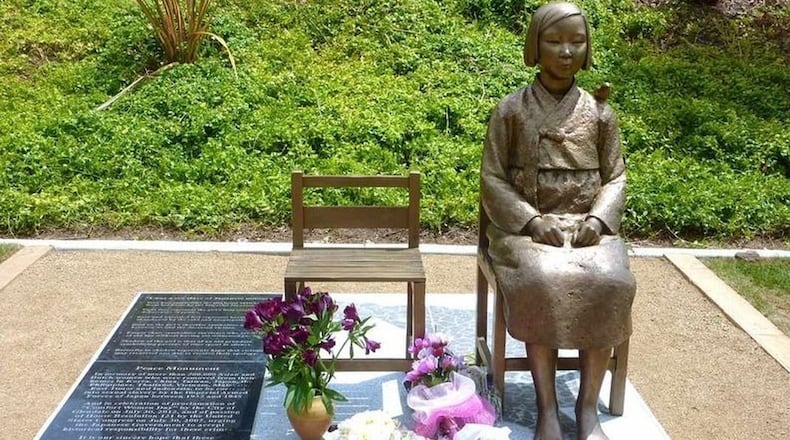The bronze figure is calm, but defiant.
She is just out of girlhood. Her feet are bare. A bronze bird is perched on her left shoulder. Her hands are gathered in loose fists. Her resolve is apparent. Her face sends out the message, “I will endure.”
Officially called "The Young Girl Statue for Peace," the 1-ton bronze statue tells the story of the so-called "Comfort Women," the young women forced into sexual slavery during World War II by Imperial Japan. It will be unveiled June 30 at Blackburn II Park in Brookhaven.
Historians estimate that 200,000 women and girls from Korea, China, the Philippines and elsewhere were victimized during the conflict. Text carved in stone accompanying the statue will tell the story of these victims, including the words “We will never forget. We will teach the truth.”
But some wish the story would be forgotten, or at least go away.
When a similar statue was erected in Busan, South Korea, last year, Japan threatened to recall its ambassador from South Korea.
Atlanta’s statue has also caused some hard feelings.
Japanese officials say that the issue of the Comfort Women was resolved with a 2015 agreement between Japan and South Korea, and that renewed attention to the issue causes hard feelings. That agreement included a monetary settlement and an apology. “Having this statue will undermine the progress,” said Tomoko Ohyama, Japanese consul in Atlanta.
But supporters of the statue insist that it is an appropriate way to memorialize women who were victims of a historic evil, an evil that is reflected by the trafficking crisis in modern times. And they question the criticism from Japanese representatives. “The degree of Japanese government intervention has been surprising to me,” said Kelly Ahn, a member of the Atlanta Comfort Women Task Force. “Every step of the way, they’ve been trying to impede us.”
The statue was originally destined for the Center for Civil and Human Rights in downtown Atlanta, but some say outside interference torpedoed those plans.
Earlier this year, the task force negotiated a memorandum of understanding that the statue would be sited on the grounds of the downtown museum. It seemed a perfect fit, especially since one of the center’s initiatives is geared toward raising consciousness about international sex trafficking.
The center held a press conference in February to announce the plan, attended by former U.S. Congressman Mike Honda. Less than a month later, the center backed out.
Helen Kim Ho, a consultant to the task force, said at the time, “The Japanese government, as it’s done in other cities, is meddling.”
Ho said, “I heard the Japanese Consulate began meeting with people, person to person, beginning Feb. 13, to discourage them.”
The outcome: The statue would not go to the center.
Kristie Raymer, vice president of marketing and sales at the Center for Civil and Human Rights, said the reason for the change in plans was a policy forbidding any new permanent artwork outside the center.
“We don’t have the real estate or the policies in place,” she said. “We sit on Coke land. … Permanent sculptures and fixtures were not part of the original design of the center.” Raymer said the center probably entered the memorandum of understanding prematurely. “When we decided to do the details, we came upon this roadblock.”
Was there pressure from the Japanese community? “That’s not accurate, not to my knowledge,” said Raymer. “We made this decision based on logistics.”
The Japanese Consulate is also unhappy that the statue will now find a home in the city of Brookhaven, in Blackburn II Park. “It is very disappointing,” said Ohyama. “We feel this is very unfortunate.”
Ohyama said her colleagues are concerned that the statue will lead to bullying of Japanese-Americans.
Brookhaven Mayor John Ernst has met with the Japanese Consulate several times to discuss the project, and kept the consulate informed about the language that will go on the carved stone, he said.
Brookhaven will “protect any citizen or resident of Brookhaven” and will be available to address any negative behavior toward Japanese-Americans. Ernst said he didn’t imagine bullying would be a large-scale problem.
He added that Brookhaven was happy to accept the statue, and said it complements the city’s ongoing efforts to combat trafficking.
Atlanta’s status as a hub of the sex trade makes the statue as relevant in Atlanta as it would be in South Korea. “I’m a history major,” said Ernst. “I believe you use history to inform yourself for the present and the future.”
The $35,000 statue was created by a South Korean husband-and-wife team, Kim Woon-Sung and Kim Seo-Kyung. There are about 50 such memorials around the globe, including nine in the U.S.
UNVEILING OF STATUE
10 a.m. June 30. Blackburn II Park, 3509 Blair Circle NE, Brookhaven. Facebook: Atlanta Comfort Women Memorial Task Force.
About the Author
Keep Reading
The Latest
Featured



